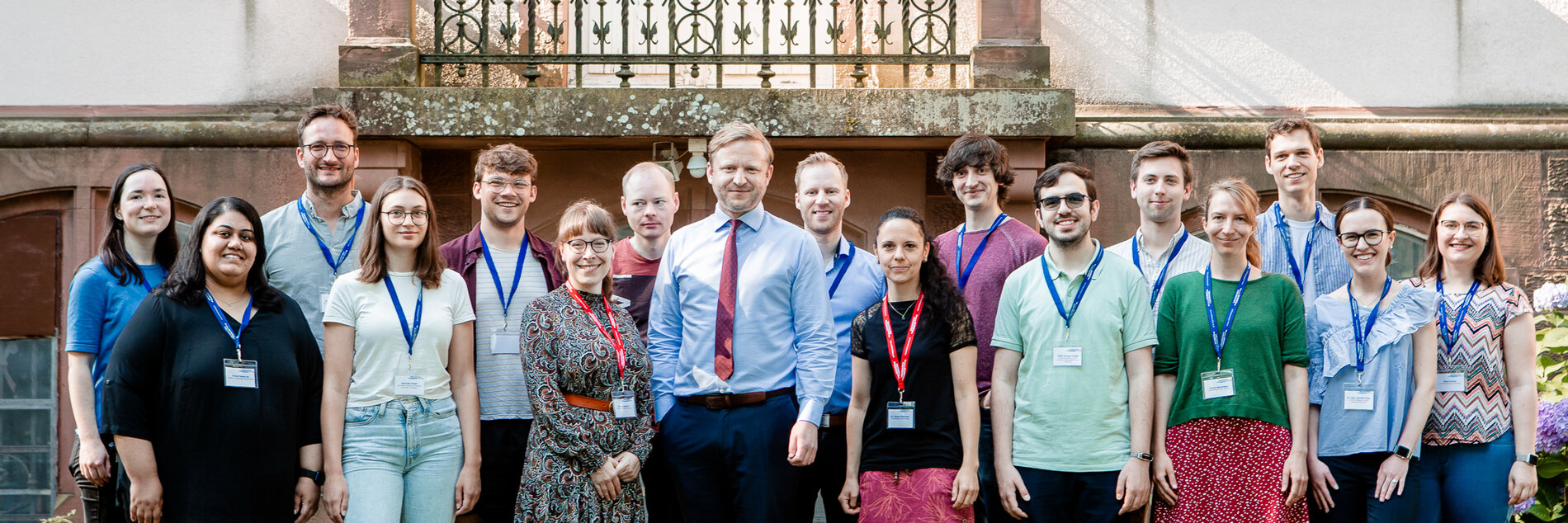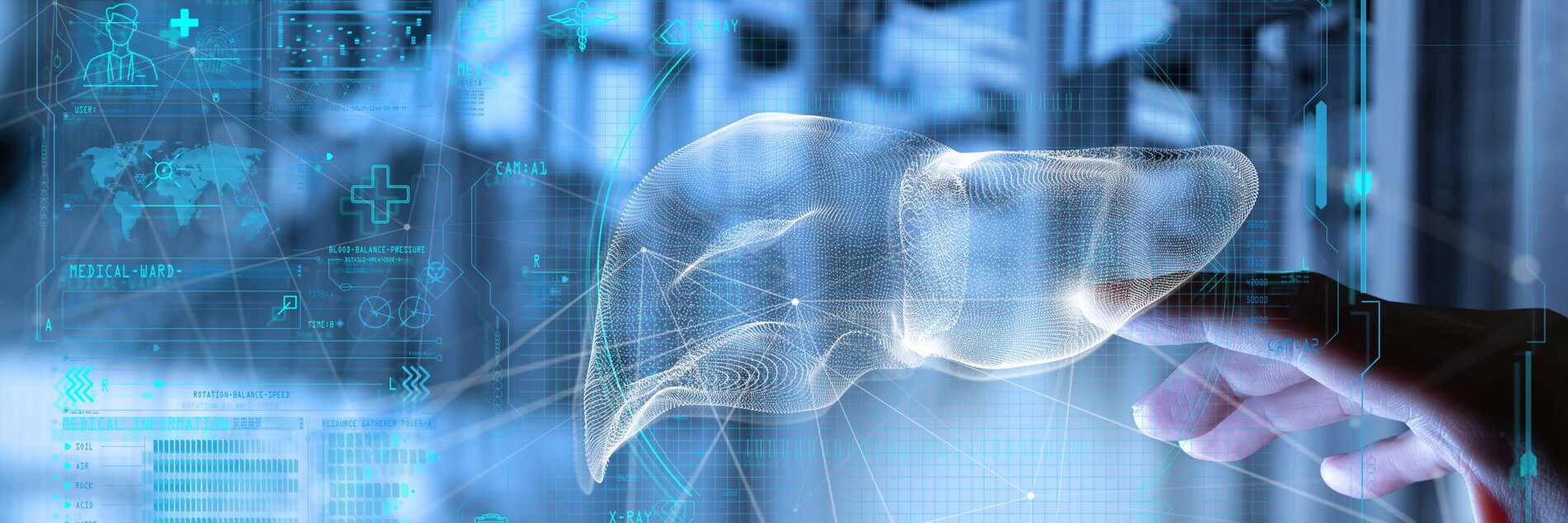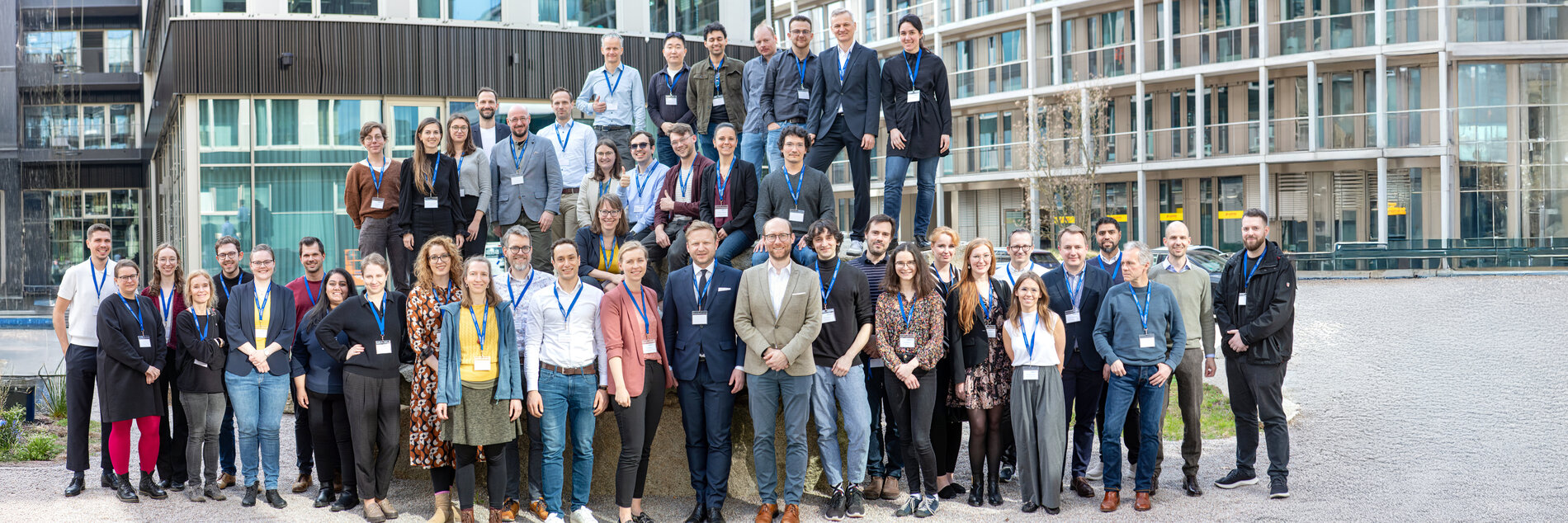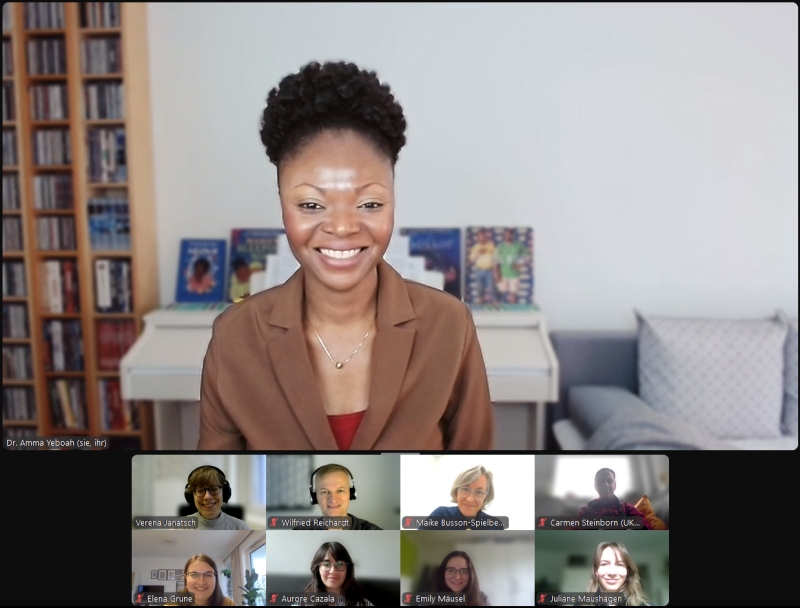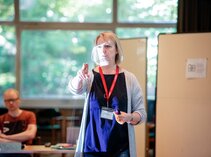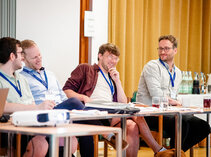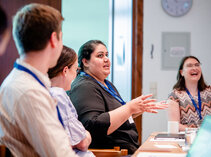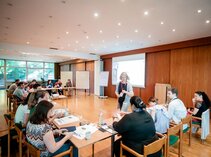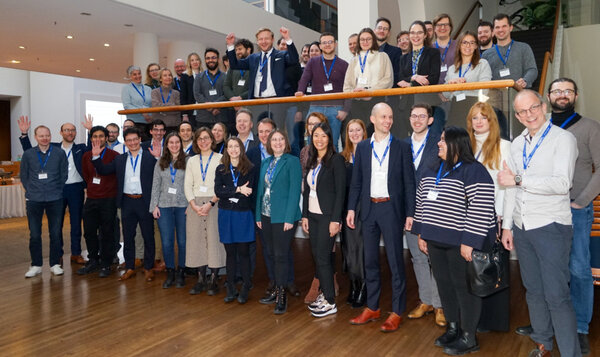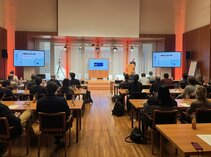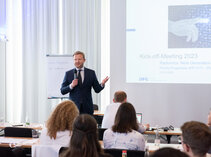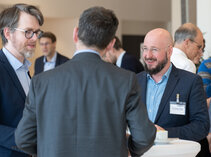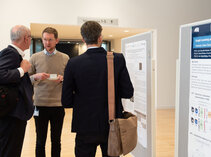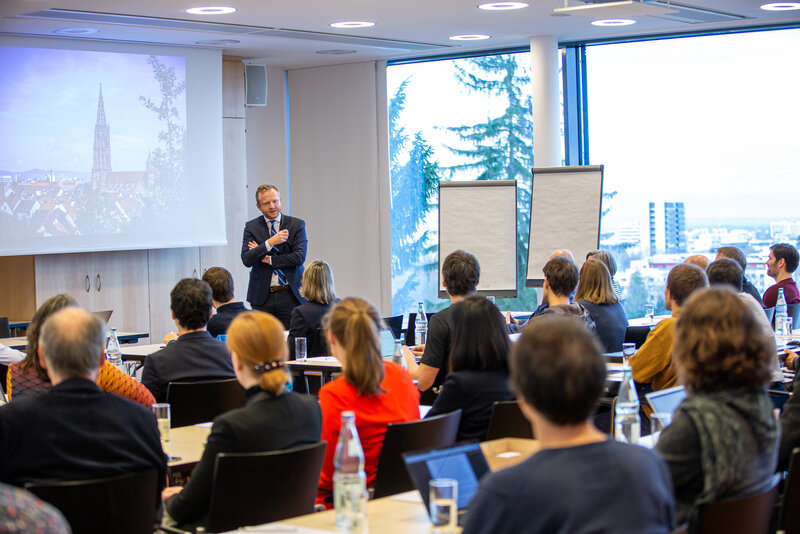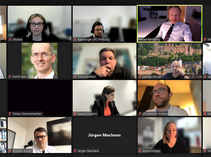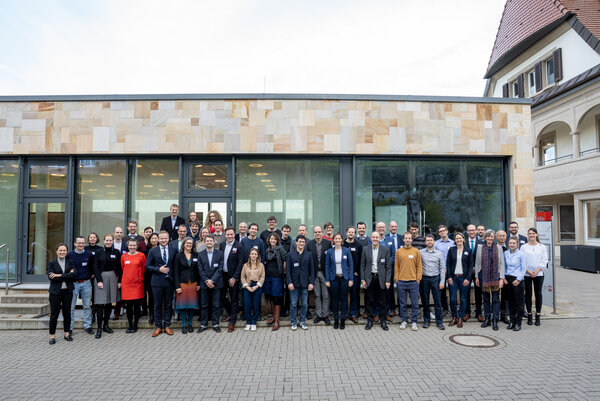Welcome to the DFG Priority Programme SPP2177
The Priority Programme (PP) SPP2177 is designed to advance the diagnostic and prognostic value of medical imaging by implementing “Radiomics” and advanced image interpretation approaches such as artificial intelligence and deep-learning algorithms in different clinical scenarios. It can be anticipated that these state-of-the-art approaches to advanced medial image post-processing will substantially enhance clinical care by exploiting information that has not been considered for medical decision-making or disease characterization yet.
Due to its clinical relevance, applications will be limited to advanced imaging modalities, such as computed tomography and magnetic resonance imaging and prospectively designed high-quality cohort studies that allow for an adequate, homogeneous scientific framework.
Special emphasis will be given to projects that focus on clinical translation and implementation of advanced image analysis in the diagnostic, therapeutic, and prognostic setting.
News
Progress and Collaboration: SPP2177 Radiomics Midterm Meeting 2025
The Midterm Meeting of the SPP2177 Radiomics programme was successfully held in Freiburg on 25th and 26th March 2025. The event gathered over 50 participants representing 16 sub-projects to share their research progress and achievements in radiomics and radiological imaging.
The SPP members presented comprehensive updates on their respective projects, showcasing the breadth and depth of ongoing research within the program. One of the meeting’s highlights was Professor Elmar Kotter’s keynote on “AI systems in routine radiology”, exploring current developments and future trends in this dynamic field. Doctor Moon Kim from University Hospital Essen introduced the RACOON collaboration platform and outlined potential data exchange opportunities for programme members. Additionally, the coordination team provided an overview of accomplished milestones and upcoming initiatives.
The meeting featured a poster exhibition highlighting innovative research approaches and dedicated time for professional networking. These interactions, along with excellent networking opportunities throughout the event, facilitated new collaborative possibilities across institutional boundaries, further enhanced by an evening networking event.
We want to thank all SPP members whose active participation and engagement brought the meeting to life and contributed to its outstanding success.
Virtual Workshop: Scientific Writing with Jeremiah Hendren
Join us in early May for an interactive online workshop tailored for Early Career Researchers from all SPP sub-projects. This sessions will guide you in refining your writing style, streamlining your writing process, and crafting compelling narratives for research papers, reports, and publications. Additionally, you will receive ongoing support to enhance your publishing journey.
For further details and registration, please visit our event page.
Lunch Meeting at the 106th RÖKO
The Lunch Meeting is scheduled to take place during the RÖKO in Wiesbaden.
This event presents an excellent opportunity for SPP scientists to network in a relaxed atmosphere while savouring a delightful meal.
For further details and the latest updates, refer to the official event website.
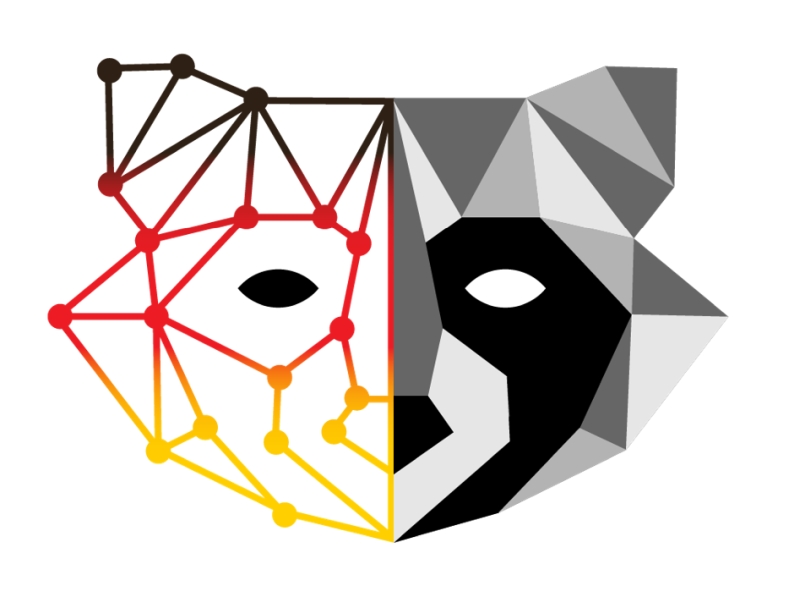
SPP2177 and NUM RACOON Collaborate on Medical Image Analysis
A new research collaboration between SPP2177 and the NUM project RACOON has started. This partnership will provide SPP sub-projects access to advanced multicentric image analysis methods.
RACOON has developed a Germany-wide infrastructure that enables both local and central analysis of image data. The main platform is operated at the Institute for Artificial Intelligence in Medicine at the University Hospital Essen under the direction of Prof. Dr. Dr. Jens Kleesiek. As part of the collaboration, SPP research groups receive targeted support to make their software tools compatible with the RACOON infrastructure. The integration of an SPP application into RACOON is currently under development and first SPP projects are expected to be connected by the end of 2025.
The collaboration marks an important step in promoting innovation and research in biomedical imaging and paves the way for scalable, efficient, and high-quality image-based analyses.
Gender Equality Workshop Inspires New Perspectives and Goals
On 11th November, our Gender Equality Workshop, led by Dr Amma Yeboah, brought together participants from diverse backgrounds to explore the gender gap in STEM disciplines. Hosted virtually, the workshop encouraged active engagement through several breakout sessions.
Participants engaged in lively discussions that directly challenged perceptions of gender, health literacy, and leadership. They reflected on the qualities that are often ascribed to masculinity or femininity, particularly in leaders and personal relationships, and considered steps toward meaningful progress in the years ahead.
We look forward to seeing how these insights and strategies will shape future progress in gender equality.
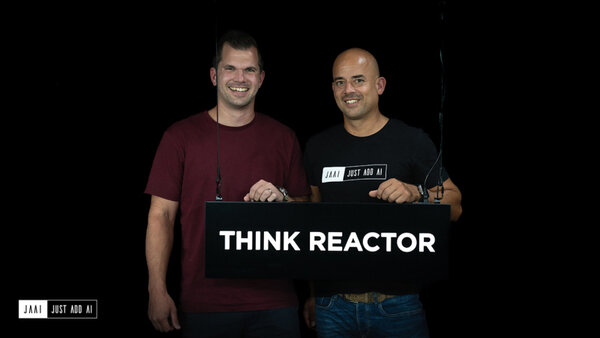
Podcast Interview: Dr Philipp Lohmann on “THINK REACTOR Lounge”
In the latest episode of THINK REACTOR Lounge, Dr Philipp Lohmann, Group Leader of Quantitative Image Analysis & AI at Forschungszentrum Jülich, shares insights into his work. Together with Roland Becker, he discusses the research carried out by his group “Nuklearmedizinische Hirntumordiagnostik” which involves preclinical and clinical evaluation of novel radiopharmaceuticals for brain tumor diagnostics. His team leverages Positron Emission Tomography (PET) and correlative imaging with advanced MRI techniques to push the boundaries of medical imaging.
Dr Philipp Lohmann is also a Principal Investigator of the the SPP project “Multimodal radiomics using MRI and amino acid PET in neuro-oncology”.
Second SPP Summer School for ECR held successfully
The second SPP Summer School took place over two days in June at the Waldhof Academy in Freiburg. Fourteen Early Career Researchers gathered in the historic villa’s rooms, enjoying the serene atmosphere while catching breaks under the old trees in the park.
The morning began with a meet and greet with the Programme Coordinator Prof Fabian Bamberg in the elegant lobby. The first day featured a workshop on “Scientific Leadership” focusing on self-leadership, leadership styles, and leadership tools, led by Patricia Meyer.
The day concluded with a keynote speech on “Female Leadership” by Lilian Gehrke-Vetterkind, which addressed the unique challenges, needs, and opportunities for women in leadership roles and sparked engaging discussions.
The second day was dedicated to the “Grant Writing” workshop, providing tools and strategies for successful grant applications. Topics included identifying funding sources, writing proposals, and understanding evaluation criteria, with practical advice from the experienced facilitator Dr Christina Schütte.
The workshops were a great success, providing participants with enhanced skills and insights in leadership and grant writing as well as friendly connections to other young researchers at different sites. The structured sessions and beautiful venue made for a valuable and enriching experience.

Virtual Statistics Workshop
Our first statistics workshop was performed on 17th and 18th June 2024. After having conducted a survey to evaluate the needs, topics of interest, and the average knowledge in statistics amongst various SPP members, with the help of our partners from the “Statistics Institute” we performed an online workshop for two days. Nineteen participants, mostly members of the SPP but also some scientists from other projects, took the opportunity to get hands-on training on radiomics-related statistical topics using Python. On the first day, the course dealt with the overall topic of data integration. Specifically, the participants learned how to do standardisation/normalisation of data, data imputation / missing value treatment, feature reduction and variable selection methods, as well as outlier detection (classic and machine learning approach) with various Python commands. On the second day, focus was put on outcome prediction/classification, classical regression models, and machine learning (e.g. decision tree, random forest, xgb, SVM etc.).
Although the research foci, scientific backgrounds, knowledge in statistics, programming skills, and topics of interest are very heterogeneous amongst SPP members, the course wanted to address as many people as possible. Afterwards, it was generally rated well and seen as quite useful for the further work of many participants.
Continuation of the gender equality programme
We are pleased to announce the continuation of the individual mentoring and coaching programme on gender equality related topics started in Phase I.
For more information and registration visit Gender Equality: Individual Mentoring & Tutoring.
SPP Winter Meeting in Berlin
On 9th January the SPP Winter Meeting was performed in Berlin at the Landesvertretung Baden-Württemberg. More than 50 representatives of 16 SPP sub-projects took part in the event.
The meeting started with a welcome by the programme coordinator Prof Fabian Bamberg. The project coordination team, represented by Dr Carmen Steinborn, then provided an update of their recent activities, followed by short presentations of each sub-projects’ latest advances and successes given by the representatives of the projects themselves.
The keynote lecture “Vom ‘Medical Need’ zur Innovation am Patientenbett – Neue Wege in der Medizinischen Translation” was given by Prof Ralf Kindervater from BIOPRO Baden-Württemberg. In his inspiring talk, he spoke about the challenges of medical translation and the importance of adequate interaction between the different players in this process. Moreover, he highlighted the importance of identifying medical needs as starting points for fruitful translation processes.
An outlook on upcoming events by the programme coordination team as well as a wrap-up by Prof Fabian Bamberg rounded off the agenda.
During the evening event, the meeting participants took the opportunity to get to know each other better, to connect, and deepen discussions about scientific and non-scientific topics.
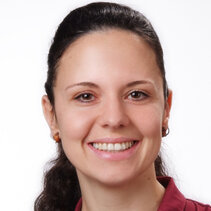
Personnel changes
Please meet our new Project Manager Dr Carmen Steinborn.
Dr Steinborn can be contacted by emailing carmen.steinborn@uniklink-freiburg.de or calling +49 761 270-39795.

Gender Equality: Individual Mentoring & Tutoring
In the final phase of the first funding period, members from various sub-projects received individual mentoring and coaching from our partner Gross & Hepp.
In one-to-one sessions, personal potential was identified and new perspectives explored. Practical examples focused on articulating one’s own needs and goals clearly and appropriately and finding answers to personal and professional questions.
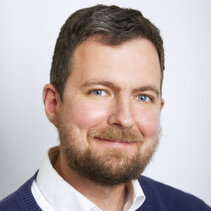
Personnel changes
Dr Marco Janoschke departed the Project Management Office in August.
We would like to express our sincere thanks for his commitment and wish him all the best in his new role at the Clinical Trials Unit.
Project meeting DEEP-LN in Cologne
On 31st July members of the DEEP-LN project team from Cologne and Würzburg met.
The successful meeting deepened the collaboration between the two sites and coordinated arrangements to reach the next milestone.
More about DEvelopment and dEployment of a Pipeline for automated LymphoNodal profiling and staging: DEEP-LN
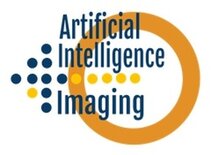
Radiomics workshop: AI4Imaging
From 28th June to 1st July, five members of different subprojects attended the radiomics workshop “Artificial Intelligence 4 Imaging: Radiomics, Deep Learning and Synthetic Data – a hands-on course” in Maastricht.
The costs of participation were covered by the SPP coordination programme.

SPP meets RACOON-JIP
On 19th June, representatives of RACOON met with interested parties from the Radiomics sub-projects, presenting their project results and highlighting synergies and potential points of connections.
SPP Kick-off Meeting Phase II
On 20th and 21st March, the charming city of Baden-Baden hosted the kick-off meeting of our project. More than 40 representatives of 16 sub-projects took part in the event.
During the evening of 20th March, participants gathered for a networking dinner, which provided a first opportunity to get to know each other and to discuss scientific and non-scientific topics.
On 21st March, the second and final phase of our Priority Programme was formally launched at the Baden-Baden Kongresshaus.
Programme Coordinator Professor Fabian Bamberg welcomed representatives of all the funded projects, followed by an opening note from Doctor Laura Stappert – our DFG (German Research Foundation) contact who supported a part of the first phase of our programme. Each subproject briefly introduced its work, providing interesting insights into the scientific background and research focus of the projects and highlighting the diversity in the field of radiomics and radiomics-related research.
The keynote lecture “Radiomics: transforming medical imaging in quantitative minable data for diagnostic and theragnostic applications” was given by Professor Philippe Lambin, one of the co-inventors of “Radiomics”. He spoke about the fundamental changes facing the healthcare sector due to new AI-based technologies, particularly in the field of biomedical imaging, and how the challenges and opportunities of these technologies will shape the clinical landscape.
Many fruitful discussions during the breaks rounded off the agenda, proving that these topics are indeed of high relevance to our audience. The day concluded with a poster session, which provided an opportunity for participants to discuss the projects presented in greater depth.
SPP2177 Closure Meeting Phase I
The closure meeting marked the conclusion of Phase I of the Priority Programme SPP2177. Overall, 55 participants from 19 different organisations attended virtually.
Programme coordinator Professor Fabian Bamberg welcomed representatives of all 17 funded projects. Together we reflected on the years spent working together and each project presented their key findings and outcomes. Also the results of the joint publication effort were reported by Dr Ralf Floca. The meeting was crowned by a keynote lecture by Professor Georg Langs of the Medical University of Vienna on the subject of “My personal take on AI and Radiomics: lessons learned and what’s next”.
The programme committee and project office thank all partners and look forward to the launch of Phase II and another successful three years together.

Scientific review of applications for the 2nd phase of SPP2177
The review of submitted project proposals took place on 24th–25th August 2022 as an online meeting.
We will keep you informed about the ongoing process of the evaluation and its results. The second phase of the program is scheduled to initiate at the beginning of 2023.
The Workshop for Early Career Researchers took place in Breisach am Rhein
As part of the SPP2177 Priority Programme and in order to promote young scientists, a workshop for Early Career Researchers was held from 28th June to 1st July 2022. For the first time since the outbreak of the pandemic, the meeting took place on site in the picturesque town of Breisach am Rhein. A group of 16 young scientists from all over Germany met to participate in a four-day workshop organized by the team of the Coordination Office at the University Medical Center Freiburg.
The meeting was opened by a welcoming speech from the Project Coordinator, Professor Fabian Bamberg, and continued with an introduction round between participants and the project coordination, essential for successful team working during the following workshop days.
On the second day, a workshop on scientific writing took place, conducted by Dr Philip Mayer, founder of a training and coaching company in Switzerland. Based on an exchange of experiences, it became clear that the challenges of scientific writing are similar for almost all participants, although they work at different institutions. The focus was placed on understanding scientific writing as a process that may and should be actively shaped. In order to increase the productivity of the writing process, specific strategies were applied in practical exercises.
The following day the participants were able to work in groups within the scope of the project management workshop led by the systemic consultant, mediator and intercultural trainer, Anna Royon-Weigelt (M.A.). The various aspects of project management, e.g project definition, planning and analysis, were discussed based on the participants' actual projects. Examples included single-center and multi-center scientific studies as well as a project involving institutional-wide patient handling. While some projects may rely on linear planning, many projects benefit from an agile approach.
The workshop was rounded off by the keynote speech “New Work” given by Daniel Hetzer, trainer and coach specializing in leadership and work organization.
Throughout the entire workshop, the participants were actively exchanging their experiences and ideas regarding the work on their own projects. The workshop became an essential platform both for consolidating the network in the first phase as well as for fostering further cooperation.
Call for SPP2177 Phase II
The call for proposals for the second funding phase was published on 6th March 2022.
You have the opportunity to submit your proposal for this call until 15th June 2022.
Further information is available on the homepage of the DFG

Gender Equality Call 2022
The Gender Equality Call lasts this year until 6th May 2022. Please send your application for the following measures:
- Student-Assistant (HIWI) Support
- Home Office Working Places
- Coverage of costs related to Gender Equality Coaching activities
to the e-mail address: spp-radiomics@uniklinik-freiburg.de
We look forward to receiving your application and will gladly announce the results as soon as the SPP Board reviewed it.
The second Radiomics workshop took place on January 2022
Our 2nd workshop “Impact of AI on Medicine & Society” within the frame of the SPP2177 Priority Programme was held online on 24–25th January 2022.
The first day of the workshop was devoted to the topic of ethics and the legal basis of using AI in medicine. A lively discussion moderated by Mrs Ilka Groenewold followed the lectures between the invited experts – Professor Saskia Nagel, Professor Rouven Porz and Professor Susanne Beck – and the audience.
The second day of the workshop generated just as much interest as the first one and began with the topic “Radiomics and ML in Radiology: potential impacts on patient care and how to get there” presented by Professor Andrea Rockall. During the break-out sessions hosted by Professor Annette Peters, Professor Horst Hahn, Dr Jan Moltz and Dr Annika Hänsch participants had an opportunity to discuss their experiences in the field of Radiomics.
The workshop ended with the speech of Professor Daniel Rückert about privacy-preserving AI in Radiology and final words from the programme coordinator, Professor Fabian Bamberg.
SPP2177 Midterm Meeting 2021 – project updates and networking
More than 50 members of the priority programme SPP2177 joined our midterm meeting on 26th October to exchange information about their projects.
After a short warm welcome by the coordinator Prof. Dr. Fabian Bamberg, updates regarding the SPP joint publication and exciting presentations of each scientific subproject filled the afternoon. The event was highlighted by the final keynote lecture of Prof Dr Hugo Aerts, director of the Artificial Intelligence in Medicine (AIM) Program at Harvard-MGB, on “Artificial Intelligence and Radiomics in Clinical Radiology”.
We are already looking forward to the next upcoming events!
SPP Radiomics Delphi Round 2 finished
In order to push the prospective application of next-generation image analysis in clinical scenarios, the Priority Program (SPP2177) has started a Delphi process to:
- establish a consensus of how to define Radiomics workflow (reflecting already available publications as well as the current state-of-the-art and research trends) and
- to identify the most relevant challenges, that hinder the application, together with strategies to overcome those challenges.
The results of this Delphi process will be published in joint publications of the Priority Program (SPP2177), to ensure a sustainable contribution for the whole community.

Annual Meeting 2020
Since the start in December 2019, the Priority Program (SPP2177) coordinated by Professor Fabian Bamberg, organized its second programm meeting on 13th October 2020, first time as a web meeting given to the restriction due to the corona pandemy.
More than 50 participants came together to share their first results and the current status of their projects. Beneath short online presentations of the running projects, new members could be introduced to the community. In additon, framework activities and measures of the first year and also outlines to future activities were presented by the coordination team. The meeting closed with an interesting talk on the medical information initiative and a fruitful discussion poiting out the high potential of joining efforts in order to advance the particular projects but also the entire field in biomedical translational imaging research.
The first workshop successfully held in Freiburg
On 13th February 2020 the first workshop “Medical informatics initiative” was held with more than 30 participants.
Given the clearly indicated need at the Kick-off symposium, the workshop was organized by the team of the coordination office at the medical center of Freiburg in collaboration with the initiators Professor Jürgen Hesser, PD Dr Klaus Maier-Hein and Professor Heinz-Peter Schlemmer.
Main topics that were covered include general opportunities and challenges in Artificial Intelligence / Radiomics in imaging, the envisioned interaction in a joint-imaging-platform (i.e. DKTK or NORA), and synergies with the medical informatics initiative as a cross-project communication area. Several SPP project members joined the very fruitful discussions in Freiburg and it became evident that there is the strong need and high potential of joining efforts in order to advance the particular projects but also the entire field in biomedical translational imaging research.
Kick-off-Meeting 2019
The Priority Programm (SPP2177) “Radiomics – Next Generation of Biomedical Imaging”, coordinated by Prof. Dr. Fabian Bamberg, had its kick-off-meeting on 16. & 17. December in Freiburg with more than 60 participants.
The kick-off event officially initiated the program and served as a first forum to enhance collaboration and synergies between the 17 funded projects in the field of Artificial Intelligence, Deep-Learning and Radiomics in Biomedical Imaging. All projects represented a broad spectrum of translational research in this emerging and highly relevant research area. The framework of the SPP-coordination comprises a number of networking opportunities, workshops and gender equality measures also to support young researchers to foster the science along the way.
The program committee and project office look forward to the next three years of top-level research and to an exciting time together.
17 projects of many great applicants have been selected
We are privileged to announce that a total of 17 projects of many great applicants have been selected by the German Research Foundation (DFG) for funding in the next 3 years with the Priority Programme “Radiomics: Next Generation of Biomedical Imaging”.
Please click here to know more about the current projects and members.
Have a look as well on the press release.
Update to the decision about funding of the individual applications
The decision about funding of the individual applications is still pending but expected to be released by end of August 2019.
Review of the Priority Programme SPP2177
On 7th May 2019, several scientists in the field of radiomics were invited to the Deutsche Forschungsgemeinschaft (DFG, German Research Foundation) head office in Bonn for the evaluation of the applied projects of the Priority Programme SPP2177 “Radiomics: Next Generation of Biomedical Imaging”. Prof Dr Fabian Bamberg, coordinator of the SPP2177, gave an introductory talk summing up the ideas and aims of the cluster, followed by a poster session containing the 51 grants for the first three-year funding period, which were internationally evaluated by fifteen distinguished reviewers. The decision about funding of the individual applications is still pending.
Radiomics Newsletters
Press Releases
Freiburg, 23.01.2023
Sieben Millionen Euro für künstliche Intelligenz in der Bildgebung
Am Universitätsklinikum Freiburg koordiniertes Forschungsprogramm wird ab März 2023 für weitere drei Jahre gefördert/KI-gestützte Analyse medizinischer Bilddaten soll helfen, neue Krankheitsanzeichen schneller zu erkennen Read more
Freiburg, 15.11.2021
Künstliche Intelligenz lernt Knochenbrüche und Nierenschäden zu erkennen
Neuer Hochleistungsserver am Universitätsklinikum Freiburg ermöglicht das Training von Künstlicher Intelligenz bei der Auswertung radiologischer Bilddaten / So könnten künftig Krankheiten noch früher erkannt werden Read more
Freiburg, 11.09.2019
Acht Millionen Euro für bundesweites Programm zu Künstlicher Intelligenz in der Bildgebung
Hochdurchsatz-Bildgebung und IT-gestützte Nachverarbeitung mit Radiomics und Deep Learning sollen die Aussagekraft biomedizinscher Daten weiter verbessern / Gesamtkoordination am Universitätsklinikum Freiburg Read more
Project Management Office
Medical Center – University of Freiburg
Center for Diagnostic and
Therapeutic Radiology
Department of Radiology
Killianstr. 5a
79106 Freiburg im Breisgau
+49 761 270-39791



